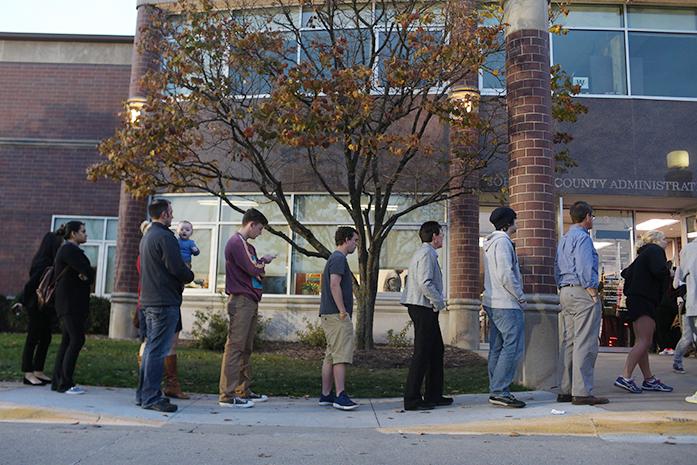Turning out at the polls is merely the first step of civic engagement.
As Feb. 5 party caucuses approach across Iowa, student leaders and local officials want people to understand the importance of voting in all elections — federal, state, and local — and be equipped with the knowledge of how to register to vote.
Iowa’s voter-registration system changed in March 2017, when then-Iowa Gov. Terry Branstad signed House Study Bill 93 into law. Under the new law, by Jan. 1, 2019, voters must show driver’s licenses, or non-driver’s IDs; passports, military IDs, veterans IDs, or voter-ID cards before being able to vote.
Those without the necessary forms of ID may use someone to attest to their identity, or they will be offered a provisional ballot.
RELATED: Iowans back voter ID
Iowa Secretary of State Paul Pate’s office mailed around 123,000 registered voters without Iowa driver’s licenses or non-driver’s IDs free voter-ID cards in December 2017.
Johnson County Auditor Travis Weipert said the Auditor’s Office will also make an effort to inform voters about the changes, and will soon release a video through Iowa City Public Television about the changes to eliminate confusion about voting requirements.
“We’re scared that they might be turned away not knowing what the voter-ID law entails,” Weipert said. “They still have the right to vote here in Iowa, but they might not think that. That’s our biggest fear is a lot of them will be turned away in the gubernatorial election or feel like they shouldn’t come out and vote because they don’t have the right to anymore.”
In a place such as Johnson County, communication about the changes is key on the University of Iowa campus. Student voters make up a sizable portion of Johnson County, with the total population sitting at around 130,000, and fall 2016 enrollment at the UI being more than 33,000.
Millennial voter turnout in the U.S. increased in the last election. According to the Pew Research Center, 49.4 percent of eligible voters voted in 2016, up from 46.4 percent in 2012. When the voter-ID legislation was introduced in 2017, student leaders from Iowa’s public universities voiced concerns that this would create a barrier preventing students from voting.
RELATED: UISG raves for student voters
Luke McClanahan, the Graduate & Professional Student Government governmental relations co-chair, said students sometimes forget how important it is to vote — especially in local elections — because of their busy schedules.
“Some students who maybe are apathetic toward local politics or politics in general, especially being in school, you don’t know if you’re going to be around in that community,” he said. “If you’re voting for certain individuals, people might not be thinking that long-term.”
McClanahan said events such as the City Council candidate forum held in fall 2017 are essential to improving turnout rates and interest in local politics.
Mitchell Dunn, the UI Student Government director of governmental relations, said UISG has had success with encouraging students to register to vote using tools such as TurboVote, and sharing information about voter registration on the T. Anne Cleary Walkway and through resident assistants in the residence halls.
RELATED: Students place national politics over local politics
Now, he said, it’s about getting people engaged with issues on the local and state level as well as the federal level. Issues ranging from funding for state universities to housing affordability are addressed at those levels of government, so Dunn said it is important that students are informed.



